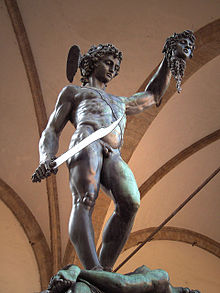Perseus (mythology)
| Perseus | |
|---|---|

|
|
| Abode | Argos |
| Symbol | Medusa's head |
| Consort | Andromeda |
| Parents | Zeus and Danaë |
| Siblings | Aeacus, Angelos, Aphrodite, Apollo, Ares, Artemis, Athena, Eileithyia, Enyo, Eris, Ersa, Hebe, Helen of Troy, Hephaestus, Heracles, Hermes, Minos, Pandia, Persephone, Rhadamanthus, the Graces, the Horae, the Litae, the Muses, the Moirai |
| Children | Perses, Heleus, Alcaeus, Sthenelus, Electryon, Mestor, Cynurus, Gorgophone, |
In Greek mythology, Perseus (/ˈpɜːrsiəs, -sjuːs/; Greek: Περσεύς), the legendary founder of Mycenae and of the Perseid dynasty of Danaans, was, alongside Cadmus and Bellerophon, the greatest Greek hero and slayer of monsters before the days of Heracles. Perseus beheaded the Gorgon Medusa and saved Andromeda from the sea monster Cetus. Perseus was the son of the mortal Danaë and the god Zeus. He was also the half-brother and great grandfather of Heracles.
Because of the obscurity of the name Perseus and the legendary character of its bearer, most etymologists pass it by, on the presumption that it might be pre-Greek; however, the name of Perseus’ native city was Greek and so were the names of his wife and relatives. There is some prospect that it descended into Greek from the Proto-Indo-European language. In that regard Robert Graves has espoused the only Greek derivation available. Perseus might be from the Greek verb, "πέρθειν" (perthein), “to waste, ravage, sack, destroy”, some form of which appears in Homeric epithets. According to Carl Darling Buck (Comparative Grammar of Greek and Latin), the –eus suffix is typically used to form an agent noun, in this case from the aorist stem, pers-. Pers-eus therefore is a sacker of cities; that is, a soldier by occupation, a fitting name for the first Mycenaean warrior.
...
Wikipedia
